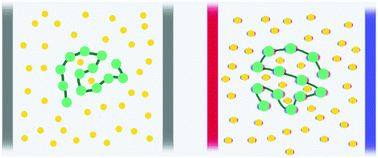Statistical theory of polarizable target compound impregnation into a polymer coil under the influence of an electric field
Abstract
The paper presents a theoretical approach for describing the influence of an electric field on the conformation of an electrically neutral dielectric polymer chain dissolved in a dielectric solvent with an admixture of a target compound. Each monomer and each molecule of the target compound carries positive excess polarizability and the solvent is described as a continuous dielectric medium. The model is based on the Flory-type mean-field theory. We demonstrate non-monotonic dependences of the expansion factor and the concentration of the target compound on the strength of the electric field and molecular polarizability. Namely, the target compound concentration in the internal polymer volume as a function of electric field strength has pronounced maxima if the molecules are polarizable. In addition, the expansion factor of the non-polarizable polymer chain can be controlled by the electric field. The dependences of the expansion factor and target compound concentration on the monomer polarizability exhibit minima and intersection points. The intersection points correspond to the equality of dielectric permittivities in the bulk solution and in the internal polymer volume.



 Please wait while we load your content...
Please wait while we load your content...